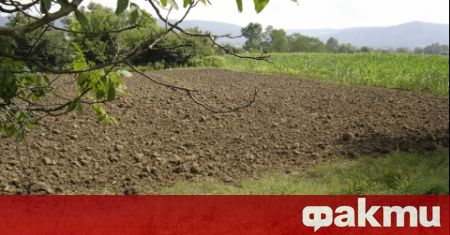
[ad_1]
The drought and bad economic year also affected the price of agricultural land in Dobrogea, which is the most expensive land in the country. According to brokers, the price per decare of land has fallen by around BGN 100-200. Statistics show that in 2019 the average price of transactions with fields in the Dobrich region is 93.8 percent higher than the country’s average, reaching 2,041 levs per decare and 2,352 levs for the most expensive properties in the Dobrich municipality.
The price of this fall was reduced by BGN 100-200 per decare in the lands of Balchik, General Toshevo, Dobrich and from BGN 2,700 per decare months ago, it is already BGN 2,300-2500. However, there are no offers, the brokers say.
According to Radostina Zhekova, president of the Dobrudzha Cereal Producers Union
there is currently no demand for land
“Payments to tenants will be made soon and for them this is a priority. Supply exceeds demand and it is logical that the price will fall, although the price of the land in Dobrogea, which is usually fourth and fifth category, was artificially inflated a few years ago, ”Zhekova quoted the Monitor newspaper.
The price range for fields in the entire Dobrich region is in the range of 1500 – 2900 BGN, which again makes the land in Dobrudja the most expensive in the country. If the drought persists and there is no snow in the winter, land in the Dobrich region will be cheaper in 2021, brokers predict.
“The annuities are distributed from mid-November to December. Some of the comrades have already started to distribute them. In the coastal municipalities and in General Toshevo they have started from 30 BGN per decare. As far as I know, near Dobrich they give 40 levs each one, in some places there are 50 leva each, depending on income. Rent must be a derivative of yield per unit area. Unfortunately
rents went up terribly a few years ago
and it is unfounded. This is more of a rivalry between farmers. The rent must be 30% of what is produced and this is written in most contracts. But in the last 3-4 years the practice of giving income of the order of 50% of production has entered, ”said Radostina Zhekova.
According to the owners, most of them have signed rental contracts for 30 per cent of the production, expressed in monetary value, but not less than BGN 15 per decare.
For reference, the average rent in Bulgaria is BGN 49 per decare. In the Dobrich district, homeowners receive an average of BGN 89 per decare. According to Kostadin Kostadinov, president of the National Association of Cereal Producers, this does not make economic sense.
“A few years ago, the furious bidding started: on the one hand, the tenants wanted to cultivate more acres of land, on the other hand, there were agricultural cooperatives that did not pay income taxes or dividends, but included them in the rents. Thus, high rents were achieved in the Dobrich region. The producer’s net profit for a decara of wheat, for example, is BGN 10-15-16. Its cost is BGN 100, plus rent, which is in the range of BGN 80-90-100. This is a normal year.
In a bad year, the manufacturer is 0: 0 or in the red
This year there will definitely be a problem with the rents. For me, this year will be a turning point in terms of rentals. Farmers have to pay for seeds and preparations, we are constantly in campaigns. When strict annuity contracts have been signed, there can be lawsuits. Since there is no money, there is no place to pay rents, “Kostadinov said.
The situation is extremely difficult, says Radostina Zhekova. Farmers will pay rents for fear of lawsuits. Another question is where they will find money. Banks have firmly withdrawn from the agricultural sector, having previously withdrawn from the tourism sector. It will be very difficult for those who do not have remnants of previous earnings.
In Balchik, the owners take more
Last year in the Dobrich region there was a 4.6% increase in rent for a rented or rented piece of land, as the price reached an average of BGN 91, almost twice as high as the national average. The highest rent was recorded in the municipality of Balchik, where landlords were paid an average rent of BGN 102. BGN 93 was in the municipality of Dobrich, BGN 92 each – in Shabla and Dobrich. The lowest was in Krushari – 81 cam.
For 13 years, the average rent in Dobrogea has quadrupled: from BGN 25 in 2006 to BGN 100 in recent years. At one point, competition for land rentals among farmers was the dominant factor, and then rents increased. At the same time, unreasonably fast and unreasonably high. There were periods when, with production growth of 30 percent, the rent payment increased by almost 100 percent. This was due to competition, expected revenue growth, etc.
Sofia, Bulgaria
[ad_2]